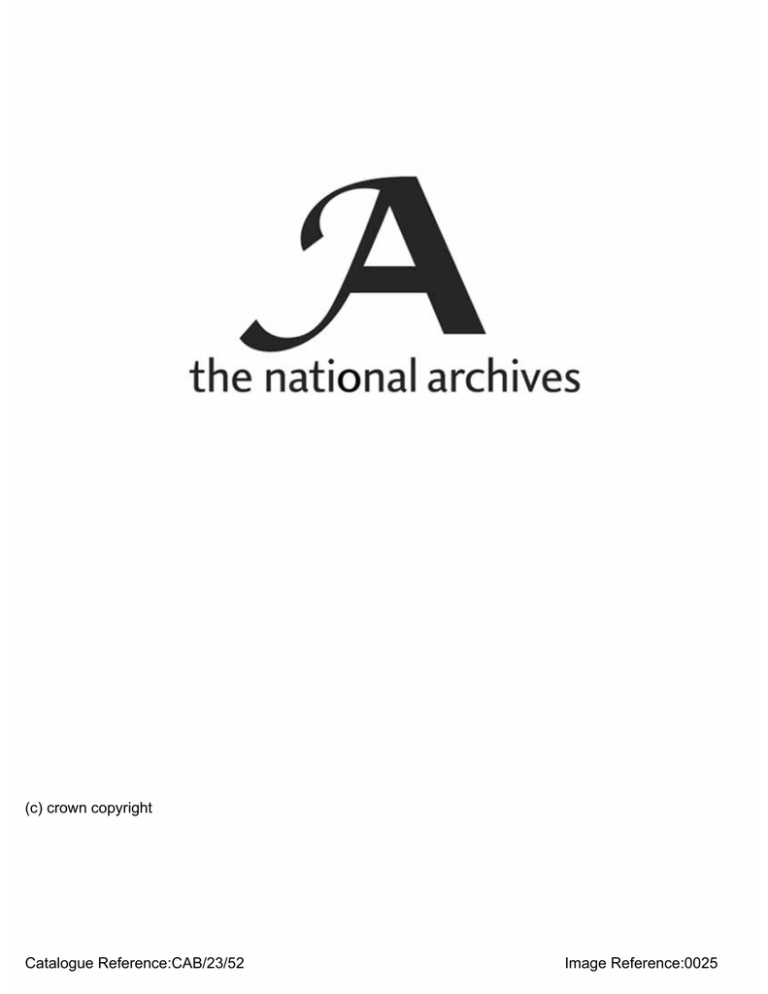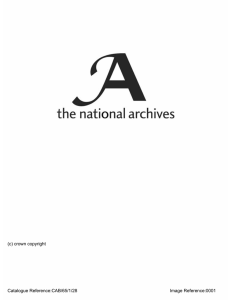(c) crown copyright Catalogue Reference:CAB/23/52 Image Reference:0025
advertisement

(c) crown copyright Catalogue Reference:CAB/23/52 Image Reference:0025 CUMENT I S THE PROPERTY OP HIS BRITANNIC MAJESTY * S GOVTilRNMENT . ) RJ&C R E T. Copy No, C A B I N E T 25 (26). Meeting of the Cabinet, to be held in the Prime M i n i s t e r s Room, HouBe of Commons, S.W.1; on PRIDAY, May 7th, 1926, at 11 A.M. AGENDA. THE INDUSTRIAL CRISIS. (Signed) M, P. A. HANKEY, Secretary, 2 Whitehall Gardens, S.W.1, 6th May, 1926, Cabinet. rtfiWmS IS THE PROPERTY OP HIS BRITANNIC MAJESTY'S GOVERNMENT . ) CAB.INET 25 (26). Copy Ho, CONCLUSIONS of a Meeting of the Cabinet held in the Prime M i n i s t e r ' a Room, House of Commons, S . W . 1 , oh PEIDAY, May 7th, 1 9 2 6 , at 1 1 . 0 A.M. PRESENT: * The Right Hon. Stanley Baldwin. II.P., Prime Minister. (In the C h a i r ) . j Right Hon. [discount Cave, G.C.M.G., liord Chancellor. The Right Hon. The Earl of Balfour, K.G., O.M., Lord President of the Council. jKost Hon. jhe Marquess of Salisbury, K,6.,G, C . V . 0 , , C B i , Lord privy Seal. The Right Hon, W, S. Churchill, O.H,,l£ P., Chanoellor of the Exchequer. Right Hon. Sir William Joynson-Hicks, Bt.,M.P., Secretary of State for Home A f f a i r s . The Right Hon. L.S.Amery, M.P., Secretary of State f o r Dominion A f f a i r s and Secretary of State f o r the Colonies. 1 Right Hon. Sir Laming Worthington-Evans, 3t,,G.B.E. ,M.P., Secretary of State f o r War. The Right Hon. The Earl of Birkenhead, Secretary of State f o r India, t Right Hon. The Right Hon. Sir Samuel Hoare, B t . , C.M.G., W. C, Bridgeman, M.P., M.P., Secretary of State for Air. P i r s t Lord of the Admiralty, Right Hon. Sir P h i l i p C u n l i f f e - L i s t e r , K.B.E. ,M.C, ,M.P., President of the Board of Trade. The Right Hon. N e v i l l e Chamberlain, M.P., Minister of Health. Right Hon, 17, Guinness, D.S.O..,M.P., Minister of Agriculture and Fisheries . The Right Hon. Sir John Gilmour, B t . , D . S , 0 . , M.P,, Secretary f o r Scotland. i Right Hon. Lord Eustace Peroy, M.P., President of the Board of Education, The Right Hon.Sir Arthur Steel-Maitland, B t , , M . P , , Minister of Labour, iRight Hon. Viscount P e e l , G.B.E., P i r s t Commissioner of Works. The Right Hon. Viscount Cecil of Chelwood, K.C., Chancellor of the Duo-hy of Lancaster, The Right Hon. Sir Douglas Hogg:/ K.C,,M.P., Attorney General. THE FOLLOWING WERE ALSO PRFSENT : The Right Hon. S i r William Mitchell-Thomson, B t . , K . B . E . , M . P . , PostmasterGeneral . ; M B p . a. Hankey, G.C.B, Secretary, INDUSTRIAL IS. vious 'inet 24 ,), Con­ jsion 5.; The Cabinet met to consider the present p o s i ­ t i o n in regard to the industrial c r i s i s and the measures required to cope with the s i t u a t i o n . The reports before the Cabinet were to the e f f e c t that there were ample supplies of food, transport, and p e t r o l , and that the Supply and Transport Organisation was working smoothly. The most serious need of the moment, however, was more p r o t e c t i o n , in view of the intimidation already c a r r i e d out and threatened. The Trades Union Council had now prohibited the movement of f l o u r , and the National Union of Railwaymen had ordered p e r m i t s ' f o r the movement of to be c a n c e l l e d . foodstuffs This meant that stronger measures would be taken i n the d i r e c t i o n of picketing the docks and other food supplies. In addition, i t was known that certain Trades Unions not at present on s t r i k e would be c a l l e d out, and i t was by no means improbable that this would extend to postal workers, including t e l e ­ graphists and telephonists . Particulars were given to the Cabinet of certain plans made f o r protecting the movement of food­ s t u f f s in the area normally fed from the Port of London, which involved, inter a l i a , the temporary use of troops in the London Docks area for protec­ t i o n purposes .. A f t e r considerable discussion, the Cabinet agreed ­ ( a ) That the provision of further protection was the f i r s t essen­ t i a l in the present s i t u a t i o n , and that, with a view to any possible developments, the forces a v a i l a b l e for this purpose should be expanded on a considerable scale: -1­ (b) That the general p r i n c i p l e s on which protection should be based should be­ as f o l l o w s : ­ ( i ) Regular troops should only be used in the l a s t r e s o r t , and should, as far as possible, be kept away from the disturbed areas u n t i l the moment for their us e had a r r i v ed: (ii) That the f i r s t l i n e on whom f e l l the r e s p o n s i b i l i t y f o r providing protection was the regular P o l i c e , and that the Home Secretary should have authority to augment them by recruiting Special Constables on the present - lines up to the l a r g e s t scale deemed practicable and necessary, both i n London and i n the country. In London, for example, he was given d i s c r e t i o n to announce that the number of Special "Constables would be increased up to 50,000: 1 (iii) That i n addition to the M i l i t a r y (who must be regarded as the l a s t r e s e r v e ) and the Special Confetables, a s p e c i a l y ^ l v i l Force should be raised as part o f the P o l i c e , which should be organised f o r action in u n i t s . In this l a t t e r connec­ tion the proposal which commended i t s e l f to the Cabinet was that units o f the T e r r i t o r i a l Army should be i n v i t e d to volunteer as a whole for s e r v i c e i n this C i v i l Force, should be sworn as Special Constables, and should form the . nucleus of special section of the Police forces: a ( c ) That a Cabinet Committee, composed as follows:The Chancellor of the Exchequer, The Home Secretary, The Secretary of State f o r War, (Major Ismay, S e c r e t a r y ) , should meet in the Chancellor of the Exchequer''a Room at the House of Commons at 3 p.m. on the same a f t e r ­ noon to work out d e t a i l s with regard to the C i v i l Force referred to above i n ( b ) ( i i i ) and to arrange the Departmental r e s p o n s i b i l i t y , with f u l l authority from the Cabinet to put the arrangements concerted i n t o immediate operation: ( d ) That the /reserves of the Fighting Forces should not be c a l l e d out: ( e ) That the T e r r i t o r i a l Army as suaoh should not be c a l l e d out": ( f) - , That the Secretary of State for War" should have authority to issue instructions to the General Officers Commanding permitting the use of " t e a r " gas in any case where a situation became 30-serious as to involve the a l t e r n a t i v e between that course and the use of f i r e ­ arms : ( g ) To take note and approve the action of the Secretary of State for War in making available as many armoured cars as possible: 1 (h) That, with reference to the a n t i c i ­ pated strike o^ postal employes, the Postmaster-General should have authority, whenever he deemed the moment appropriate, t o issue a warning as to the consequences to established C i v i l Servants who deserted t h e i r posts. The question of whether he should s t a t e that they were not only l i a b l e to dismissal but whether he should also mention the loss of pension rights was l e f t to his d i s c r e t i o n : (i) To take note that the First Lord of the Admiralty had already authorised the issue of a warning to c e r t a i n Admiralty employes who were on s t r i k e : ij) To take note t h a t , while unnecessary expenditure is to be avoided, the Chancellor of the Exchequer w i l l find the funds necessary f o r the measures atithorised by the Cabinet: ( k ) That a Cabinet Committee, composed as follows — 36 The Lord Chancellor, The Secretary of State for India, The Attorney-General, (Mr R.B. Howorth, Secretary) should meet to consider what l e g i s l a ­ t i o n , i f any, to strengthen the powers of the Government i s necessary and possible, either at the present juncture or in the near future. At an e a r l i e r stage 0^ the Cabinet, i t had been arranged that the Home Secretary should discuss with the Attorney-General and the Secretary of State for India the question Of whether recent action taken by certain Trades Unions to i n t e r ­ rupt the carriage of foodstuffs was a breach o f ­ the e x i s t i n g law and whether any action was required in consequence t h e r e o f . I t is assumed that the Cabinet's intention i s that the Home Secretary should discuss this question with the above Committee which i s reviewing the same subject from a wider aspect. Whit ehal 1 Gardens , S .W. 1, May 7, 1926.




